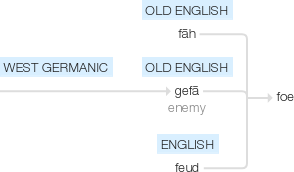Foe
Old English fāh ‘hostile’ and gefā ‘enemy’, of West Germanic origin; related to feud.
wiktionary
From Middle English fo(“foe; hostile”), from earlier ifo(“foe”), from Old English ġefāh(“enemy”), from fāh(“hostile”), from Proto-West Germanic *faih, from Proto-Germanic *faihaz (compare Old Frisian fāch(“punishable”), Middle High German gevēch(“feuder”)), from Proto-Indo-European *peik/k̑-(“to hate, be hostile”) (compare Middle Irish óech(“enemy, fiend”), Lithuanian pìktas(“evil”)).
Acronym of fifty-one ergs., due to the value of a "foe", 1 foe = 1051 ergs; coined by Gerald Brown of Stony Brook University in his work with Hans Bethe.
etymonline
foe (n.)
Old English gefea, gefa "foe, enemy, adversary in a blood feud" (the prefix denotes "mutuality"), from adjective fah "at feud, hostile," also "guilty, criminal," from Proto-Germanic *faihaz (source also of Old High German fehan "to hate," Gothic faih "deception"), perhaps from the same PIE source that yielded Sanskrit pisunah "malicious," picacah "demon;" Lithuanian piktas "wicked, angry," peikti "to blame." Weaker sense of "adversary" is first recorded c. 1600.
